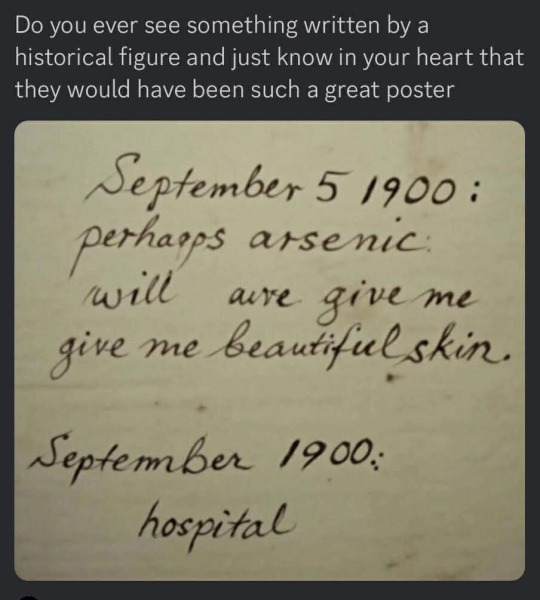Quote
History was full of the bones of good men who’d followed bad orders in the hope that they could soften the blow. Oh, yes, there were worse things they could do, but most of them began right where they started following bad orders.
Terry Pratchett, Jingo (via larien-vardamir-arcamonel)
463 notes
·
View notes
Text
Oh no no, you misunderstand. I am extremely lame, I'm just a good and faithful servant of my count. COUNT.
0 notes
Text
today I learnt that in KCD1 when you go hunting with Hans and have that little competition (and you know how you can win it even if you only killed a single rabbit?), if you follow him around you can see him actually shoot and kill hares, he just doesn't collect them. You can even just follow him around and collect his kills.
He devised this competition to let Henry win 🥹
135 notes
·
View notes
Text
oh, fine. let's talk about sin.
This is a note about religion and KCD2—particularly how it applies to Hans & Henry’s relationship development.
It isn’t my intention to write the definitive post on this subject, and this is certainly not an academic summary, a Tumblr History Lesson, or a thesis statement on why you can’t write whatever the hell you please. But as much as I detest fandom discourse, I also dislike seeing my words misused as a bludgeon against fan writers, and so I am stepping in to provide what I hope will be some useful CliffsNotes to everyone.
Take them or leave them, they are here with the intention to help fic writers make (briefly) informed decisions about how to embark on their creative research. KCD2 spoilers under the cut. PSA: If I see you using this nastily to harass fanfic writers you don't like, I will be very upset with you.
The medieval Catholic Church's doctrines were not representative of a homogeneous, mythical One Medieval Worldview on everyday life—nor was the MCC a monolith of its own. It is important to differentiate the Catholic institution from “the average medieval person’s ideas about daily life.” A quick foray into documents and moral treatises written by church officials at the time will reveal that the clergy was also not a monolith, but a hierarchy of individuals with vastly different ideas and recommendations on how humans should live. We simply cannot stamp a single religious document, decree, or interpretation (that was successfully published and preserved for hundreds of years; the vast majority were not) as a one-size-fits-all primer on what your average village blacksmith thought about things. I would certainly bristle were a historian from 2800 to suggest my country’s government & preeminent religious institutions painted an accurate picture of my (or my neighbors’) moral opinions on every subject under the sun. I bet you would, too. Critically, this does not mean all the common people embraced same-sex romance and all the religious officials reviled it. Indeed, it means people are people and their opinions will differ based on their personal experience, environment, personality, and priorities. Christianity profoundly affected the medieval world and mentality in ways both conscious and unconscious, much as any major global religion does, but it does not and did not make Europe into a dystopian Christian hivemind that thoughtlessly parroted a single unified view of every topic under the sun.

Religious opposition vs. religious guilt. Remembering that “people are people,” it is likewise important to differentiate religious opposition from religious guilt. Male lovers, particularly those in a position of high status (who were expected to produce heirs), would certainly face opposition to their desire to fuck off into the woods and kiss their boyfriend forever. It would certainly not be prudent or safe for a minor lord like Hans Capon to openly flaunt his romantic love for his squire; religiosity-fueled accusations of sodomy were useful as political bludgeons to threaten enemies and de-legitimize rivals. Caution is required. However, I find it is also important to note that Hans and Henry seem to express no personal guilt over their love for each other, religious or otherwise. It is telling that they do not step back from their relationship after consummating it under duress; on the contrary, both of them immediately seem to take it for granted that they will continue sharing their lives without any further negotiation required, and admitting their romantic feelings for each other has changed little of this, save for bringing them closer and providing relief. It is also telling that if Henry chooses to confess to his dream-parents that his devotion to Hans is romantic in nature, they react with surprise, but do not lecture him about sin. (In fact, his mother immediately leaps to Henry’s defense after his father reacts with shock.) Henry himself expresses no grief to them beyond a vague acknowledgement that hearing this must be a surprise. This is important—Henry’s parents appear in his dreams as representations of Henry’s inner doubts, guilt, grief, and misgivings. They do not throw up any real opposition or disgust to his intention to “settle down” with Hans. (Which is frankly a bonkers thing for Henry to say in any sense.) Despite the opposition they face from their environment and the expectations of status placed upon them—and despite Hans’s anxiety about being forced into a betrothal and how this may frustrate his intention to spend every waking moment with Henry—Henry and Hans both seem to feel completely positive about consummating their romantic relationship. For all intents and purposes, they canonically provide each other with comfort, love, and certainty. Not a shred of guilt or self-hate bubbles up into the canon text where each other is concerned. (This isn’t to say you can’t add this element in your fanworks if you choose. I’m not your dream-Martin!) NOTE: There is one moment during The Kiss scene in which Henry shows clear inner conflict. After Hans initiates a kiss (that Henry visibly rushes to accept), Henry turns his face away from him briefly, which causes Hans to perceive rejection and scurry away. Henry's expression is visibly troubled before he turns to the door. I see a valid argument for interpreting this brief expression of distress as gut-reaction frustration or revulsion, either at himself or even to the physical kiss, but we don’t really have enough canon input to say for certain what causes this flash of doubt. In any case, when it’s gone, it’s gone. At least for the purposes of KCD2 where it left us. You can’t “break up” with Hans after this or back out of the romance; Henry has decided for himself that the only way to go is forward.

Everything’s the same—but different. Homophobia in the 1400s was a different beast from homophobia in the 2000s. I will not dive into this here because I've written about it elsewhere to share background research on my own monastery fic, and because the topic is far too large to summarize in a bullet-pointed list. Simply, the medieval world did not codify sex acts or romantic feelings as identity markers in the way we do; while sodomy was certainly a taboo, this was a classification of non-reproductive sex acts, not slang for “gay man.” We cannot, in essence, “backport” our contemporary homophobia into the Middle Ages; it doesn’t make sense. Similarly, we cannot backport our bizarre late-1900s+ anxiety about pregnancy termination into 1403, but if you think I'm going to dive into that here except by way of brief comparison, you are cuh-razy. Worth noting that taboo also does not mean alien... or secret. More on that below.

Normalcy, Secrecy, and Taboo. One thing KCD2 (and KCD1, to a lesser extent) does very well is dismiss the Victorianized pseudo-history that same-sex romance, sex, and affection were some sort of widely-kept secret from society that did not dawn upon people until the second half of the thousands. In KCD, no one is surprised or bewildered by stories, both fictional and local, of same-sex lovers. Yes, medieval people knew about gay sex and no, “discovering” that it exists would not have shocked them—because a taboo is not necessarily an unknown. While NPCs react with different shades of opinion to conversations about same-sex romance, the world does not treat this as alien; it wasn’t. It is discussed casually, albeit with some discretion depending on context and company. KCD2 even enables you to play a Henry who has had prior sexual experience with men (see the Black Bartosch interactions) and has already embraced his own same-sex attraction to the extent he can confidently, casually sexually advance on men.

The Elephant in the Room: Class. Remember that the class divide at hand provides as much—if not more—opposition than the religiosity. Feudalism itself was built into medieval Catholicism. I sometimes think KCD downplays the importance of class, especially in KCD1, as it allows Henry to openly speak to Hans in ways that are unthinkably inappropriate given the feudal consciousness of the time, with almost no punishment or reaction from those around them. Not just because these interactions might indeed arouse suspicions of same-sex romance, but because a commoner risks severe punishment (or death!) for putting his hands on a lord, interrupting him, and insulting him in public. (Yes, including a noble’s bastard, a designation which is more harmful than not in many ways.) That's not to say Hans himself would not allow Henry to speak to him in this way; it's clear he desperately enjoys the novelty of someone who speaks to him freely, even in the earliest hours of KCD1, before they are tightly bonded. But it is strange there is so little blowback or external punishment for Henry when he baps His Lordship upside the head and calls him a buffoon in front of a gaggle of His Lordship's soldiers, on the precipice of dangerous military action, with Captain Bernard no doubt on the verge of apoplexy nearby. For this reason more than any other, I would argue, Henry and Hans’s relationship spits in the face of feudal order—and it does so even without the romantic consummation.

That's enough of that now, Jesus. I hope someone finds this to be a helpful bullet-point summary and it facilitates a more confident venture into historical fiction research! So TLDR; regarding the fandom's current anxiety of, "Am I making the Sin of it all too big of a deal?" my ultimate answer is yes, but also no, for it deeply depends on the context and the creator's intention. Love you lady, buhbye.
393 notes
·
View notes
Text
worlds slowest fanfic author tries really really hard
22K notes
·
View notes
Photo



Bear Vases // The Paper Zoo Keeper on Etsy
4K notes
·
View notes
Text
Im just very smart and i see gay subtext in everything
37K notes
·
View notes
Text

What have we become. Neměnte se nikdy
141 notes
·
View notes
Text
Born to don't wanna. Forced to gotta
65K notes
·
View notes











